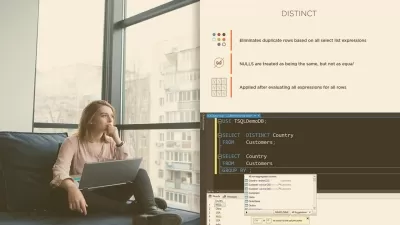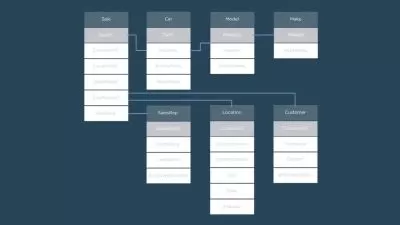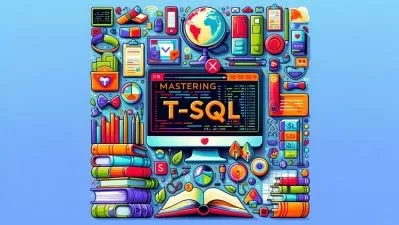Crack SQL Interview : 200+ Questions with Concept Building
Sourabh Sahu
11:08:54
Description
The Ultimate Course for cracking Interviews with SQL Questions. The course cover basic to advance level question
What You'll Learn?
- Basic to advanced SQL query writing
- Joins and subqueries
- Normalization and denormalization
- Entity-Relationship Diagrams (ERDs)
- Indexing and performance optimization
- Window functions
- Common Table Expressions (CTEs)
- Stored procedures and functions
- Triggers and events
- Aggregations and grouping
- Query optimization
- Problem-solving techniques
- Explaining complex queries
- Whiteboarding SQL solutions
- Data preparation and cleaning
- Security and access control
Who is this for?
What You Need to Know?
More details
DescriptionCourse Objective: Master SQL for technical interviews and enhance database proficiency
Target Audience: Data Engineers, Analysts, Scientists, Software Engineers, DBAs, and aspiring data professionals
Key Learning Areas:
Foundational to advanced SQL concepts
Complex query writing and optimization
Database design principles
Performance tuning techniques
Practical Focus:
Real-world SQL problem-solving
Hands-on exercises and case studies
Mock interview scenarios
Topics Covered:
Data manipulation (SELECT, INSERT, UPDATE, DELETE)
Join operations and subqueries
Window functions and Common Table Expressions (CTEs)
Query optimization and execution plan analysis
Skills Development:
Efficient problem-solving approaches
Clear articulation of SQL solutions
Whiteboarding complex queries
Career Benefits:
Confidence in technical interviews
Enhanced SQL proficiency for various data roles
Competitive edge in the job market
Learning Outcomes:
Ability to tackle complex SQL challenges
Improved database performance optimization skills
Effective communication of database concepts
Course Delivery: Blend of theoretical instruction and practical application
Final Goal: Prepare students to excel in SQL-focused technical interviews and advance their careers in the data industry
Topics Covered in the Course:
1. SQL Fundamentals
Basic SQL syntax and structure
SELECT statements and data retrieval
Filtering with WHERE clauses
Sorting results with ORDER BY
Limiting result sets
2. Data Manipulation
INSERT statements for adding data
UPDATE statements for modifying existing data
DELETE statements for removing data
MERGE statements for upserts
3. Table Operations
CREATE TABLE syntax and best practices
ALTER TABLE for modifying table structures
DROP and TRUNCATE operations
Temporary tables and their uses
4. Joins and Relationships
INNER, LEFT, RIGHT, and FULL OUTER JOINs
Self-joins and their applications
CROSS JOINs and Cartesian products
Handling NULL values in joins
5. Subqueries and Nested Queries
Correlated and non-correlated subqueries
Subqueries in SELECT, FROM, and WHERE clauses
EXISTS and NOT EXISTS operations
Comparing subquery results with ANY and ALL
6. Aggregation and Grouping
Aggregate functions (SUM, AVG, COUNT, etc.)
GROUP BY clauses for data summarization
HAVING clauses for filtering grouped data
Dealing with NULL values in aggregations
7. Advanced SQL Techniques
Window functions for analytics
Common Table Expressions (CTEs) for query readability
Recursive CTEs for hierarchical data
Pivoting and unpivoting data
8. Data Types and Functions
Understanding and using various SQL data types
Date and time functions
String manipulation functions
Numeric and mathematical functions
Conditional expressions (CASE statements)
9. Indexes and Performance Tuning
Creating and using indexes effectively
Understanding query execution plans
Identifying and resolving performance bottlenecks
Statistics and their impact on query optimization
10. Transactions and Concurrency
ACID properties of transactions
Transaction isolation levels
Handling deadlocks and race conditions
Optimistic vs. pessimistic locking
11. Views and Stored Procedures
Creating and managing views
Materialized views for performance
Writing and optimizing stored procedures
Functions vs. stored procedures
12. Database Design Principles
Normalization and denormalization techniques
Entity-Relationship Diagrams (ERDs)
Primary and foreign key constraints
Maintaining data integrity
13. Security and Access Control
User authentication and authorization
Role-based access control
Row-level and column-level security
Auditing database activities
14. Handling Large Datasets
Partitioning strategies for big tables
Batch processing techniques
Optimizing queries for large-scale data
Indexing strategies for big data
15. SQL in Data Analysis
Writing complex analytical queries
Cohort analysis techniques
Time series analysis in SQL
A/B testing with SQL
16. Interview Strategies
Approaching and breaking down complex SQL problems
Optimizing queries on the fly
Explaining your thought process effectively
Handling ambiguous requirements in interview questions
Each topic is covered in-depth with practical examples, real-world scenarios, and interview-style questions to ensure comprehensive understanding and application.
Who this course is for:
- This course is designed for professionals and aspiring candidates in data-related fields who are preparing for technical interviews or seeking to enhance their SQL skills.
- The primary audience includes: Data Engineers
- Professionals responsible for designing, building, and maintaining data pipelines and infrastructure.
- Data Analysts: Individuals who work with data to provide insights and support decision-making processes.
- Data Scientists: Professionals who use statistical and machine learning techniques to analyze complex data sets.
- Software Engineers: Developers who work on applications that interact with databases and require SQL knowledge.
- Database Administrators (DBAs): Specialists responsible for the performance, integrity, and security of databases.
- Business Intelligence Analysts: Professionals who use data to drive business strategy and decision-making.
- Recent Graduates: Those with a background in computer science, information systems, or related fields looking to start their career in data-driven roles.
- Career Changers: Individuals transitioning into data-related roles from other fields.
- IT Professionals: Those looking to expand their skill set to include database management and SQL proficiency.
- Students: Upper-level undergraduate or graduate students in computer science, data science, or related programs preparing for internships or entry-level positions. This course is suitable for beginners with basic SQL knowledge looking to advance their skills, as well as experienced professionals aiming to refine their expertise and prepare for challenging interview questions in the data industry.
Course Objective: Master SQL for technical interviews and enhance database proficiency
Target Audience: Data Engineers, Analysts, Scientists, Software Engineers, DBAs, and aspiring data professionals
Key Learning Areas:
Foundational to advanced SQL concepts
Complex query writing and optimization
Database design principles
Performance tuning techniques
Practical Focus:
Real-world SQL problem-solving
Hands-on exercises and case studies
Mock interview scenarios
Topics Covered:
Data manipulation (SELECT, INSERT, UPDATE, DELETE)
Join operations and subqueries
Window functions and Common Table Expressions (CTEs)
Query optimization and execution plan analysis
Skills Development:
Efficient problem-solving approaches
Clear articulation of SQL solutions
Whiteboarding complex queries
Career Benefits:
Confidence in technical interviews
Enhanced SQL proficiency for various data roles
Competitive edge in the job market
Learning Outcomes:
Ability to tackle complex SQL challenges
Improved database performance optimization skills
Effective communication of database concepts
Course Delivery: Blend of theoretical instruction and practical application
Final Goal: Prepare students to excel in SQL-focused technical interviews and advance their careers in the data industry
Topics Covered in the Course:
1. SQL Fundamentals
Basic SQL syntax and structure
SELECT statements and data retrieval
Filtering with WHERE clauses
Sorting results with ORDER BY
Limiting result sets
2. Data Manipulation
INSERT statements for adding data
UPDATE statements for modifying existing data
DELETE statements for removing data
MERGE statements for upserts
3. Table Operations
CREATE TABLE syntax and best practices
ALTER TABLE for modifying table structures
DROP and TRUNCATE operations
Temporary tables and their uses
4. Joins and Relationships
INNER, LEFT, RIGHT, and FULL OUTER JOINs
Self-joins and their applications
CROSS JOINs and Cartesian products
Handling NULL values in joins
5. Subqueries and Nested Queries
Correlated and non-correlated subqueries
Subqueries in SELECT, FROM, and WHERE clauses
EXISTS and NOT EXISTS operations
Comparing subquery results with ANY and ALL
6. Aggregation and Grouping
Aggregate functions (SUM, AVG, COUNT, etc.)
GROUP BY clauses for data summarization
HAVING clauses for filtering grouped data
Dealing with NULL values in aggregations
7. Advanced SQL Techniques
Window functions for analytics
Common Table Expressions (CTEs) for query readability
Recursive CTEs for hierarchical data
Pivoting and unpivoting data
8. Data Types and Functions
Understanding and using various SQL data types
Date and time functions
String manipulation functions
Numeric and mathematical functions
Conditional expressions (CASE statements)
9. Indexes and Performance Tuning
Creating and using indexes effectively
Understanding query execution plans
Identifying and resolving performance bottlenecks
Statistics and their impact on query optimization
10. Transactions and Concurrency
ACID properties of transactions
Transaction isolation levels
Handling deadlocks and race conditions
Optimistic vs. pessimistic locking
11. Views and Stored Procedures
Creating and managing views
Materialized views for performance
Writing and optimizing stored procedures
Functions vs. stored procedures
12. Database Design Principles
Normalization and denormalization techniques
Entity-Relationship Diagrams (ERDs)
Primary and foreign key constraints
Maintaining data integrity
13. Security and Access Control
User authentication and authorization
Role-based access control
Row-level and column-level security
Auditing database activities
14. Handling Large Datasets
Partitioning strategies for big tables
Batch processing techniques
Optimizing queries for large-scale data
Indexing strategies for big data
15. SQL in Data Analysis
Writing complex analytical queries
Cohort analysis techniques
Time series analysis in SQL
A/B testing with SQL
16. Interview Strategies
Approaching and breaking down complex SQL problems
Optimizing queries on the fly
Explaining your thought process effectively
Handling ambiguous requirements in interview questions
Each topic is covered in-depth with practical examples, real-world scenarios, and interview-style questions to ensure comprehensive understanding and application.
Who this course is for:
- This course is designed for professionals and aspiring candidates in data-related fields who are preparing for technical interviews or seeking to enhance their SQL skills.
- The primary audience includes: Data Engineers
- Professionals responsible for designing, building, and maintaining data pipelines and infrastructure.
- Data Analysts: Individuals who work with data to provide insights and support decision-making processes.
- Data Scientists: Professionals who use statistical and machine learning techniques to analyze complex data sets.
- Software Engineers: Developers who work on applications that interact with databases and require SQL knowledge.
- Database Administrators (DBAs): Specialists responsible for the performance, integrity, and security of databases.
- Business Intelligence Analysts: Professionals who use data to drive business strategy and decision-making.
- Recent Graduates: Those with a background in computer science, information systems, or related fields looking to start their career in data-driven roles.
- Career Changers: Individuals transitioning into data-related roles from other fields.
- IT Professionals: Those looking to expand their skill set to include database management and SQL proficiency.
- Students: Upper-level undergraduate or graduate students in computer science, data science, or related programs preparing for internships or entry-level positions. This course is suitable for beginners with basic SQL knowledge looking to advance their skills, as well as experienced professionals aiming to refine their expertise and prepare for challenging interview questions in the data industry.
User Reviews
Rating
Sourabh Sahu
Instructor's Courses
Udemy
View courses Udemy- language english
- Training sessions 6
- duration 11:08:54
- Release Date 2025/01/16











